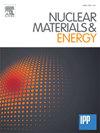Divertor erosion at ASDEX Upgrade during helium plasma operations
IF 2.3
2区 物理与天体物理
Q1 NUCLEAR SCIENCE & TECHNOLOGY
引用次数: 0
Abstract
The effect of helium plasma operation on the erosion of plasma-facing components at the low-field side divertor of ASDEX Upgrade was investigated during the 2022 helium experimental campaign. A set of tungsten-covered graphite samples with small platinum marker spots was exposed to both L-mode and H-mode plasma discharges. The highest net erosion of over 1.1 nm/s was observed around the H-mode strike point similar to the case in deuterium plasma. Significant helium inventories of about 6 × 1016 He/cm2 were measured in the scrape-off layer region of the divertor. Impurity deposition including boron and deuterium showed a distinct peak up to 2.4 × 1017 B/cm2 and 1.0 × 1016 D/cm2 between the strike points, and significant boron inventories up to 5.9 × 1016 B/cm2 were also measured on the scrape-off layer side of the H-mode strike point. Platinum re-deposition was not detected between the marker spots, suggesting that it occurs only very locally within the markers. Overall erosion was, as expected, higher than in deuterium discharges, and it also remained comparatively high towards the scrape-off layer, unlike with deuterium.
氦等离子体运行期间 ASDEX 升级版的分流器侵蚀
在 2022 年的氦实验活动中,研究了氦等离子体运行对 ASDEX 升级版低场侧分流器面向等离子体的部件的侵蚀作用。一组带有小铂标记点的钨覆盖石墨样品同时暴露在 L 模式和 H 模式等离子体放电中。与氘等离子体中的情况类似,在 H 模式撞击点附近观察到了超过 1.1 nm/s 的最高净侵蚀速度。在分流器的刮除层区域测得大量氦存量,约为 6 × 1016 He/cm2。包括硼和氘在内的杂质沉积在打击点之间出现了一个明显的峰值,最高可达 2.4 × 1017 B/cm2 和 1.0 × 1016 D/cm2,在 H 模式打击点的刮离层一侧也测得了大量硼存量,最高可达 5.9 × 1016 B/cm2。在标记点之间没有检测到铂的再沉积,这表明铂的再沉积只发生在标记点的非常局部的地方。正如预期的那样,整体侵蚀程度高于氘放电,而且与氘放电不同的是,向刮离层方向的侵蚀程度仍然相对较高。
本文章由计算机程序翻译,如有差异,请以英文原文为准。
求助全文
约1分钟内获得全文
求助全文
来源期刊

Nuclear Materials and Energy
Materials Science-Materials Science (miscellaneous)
CiteScore
3.70
自引率
15.40%
发文量
175
审稿时长
20 weeks
期刊介绍:
The open-access journal Nuclear Materials and Energy is devoted to the growing field of research for material application in the production of nuclear energy. Nuclear Materials and Energy publishes original research articles of up to 6 pages in length.
 求助内容:
求助内容: 应助结果提醒方式:
应助结果提醒方式:


